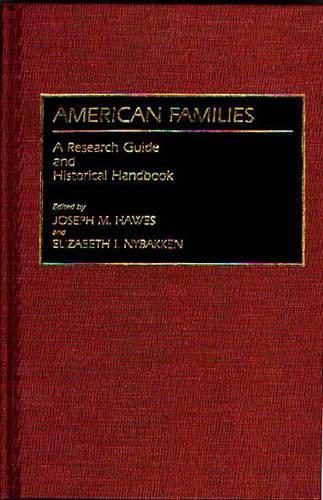
American Families: A Research Guide and Historical Handbook
(Hardback)
Publishing Details
American Families: A Research Guide and Historical Handbook
By (Author) Joseph M. Hawes
By (author) Elizabet Nybakken
Bloomsbury Publishing PLC
Greenwood Press
24th August 1991
United States
Classifications
Tertiary Education
Non Fiction
Social and cultural history
306.850973
Physical Properties
Hardback
448
Description
This work serves as an introductory reference guide to the growing body of literature on the history of the American family. Recognizing the family unit as the institution most central to any society, the volume covers a broad range of theoretical approaches which concentrate on relationships within the family and between the family and the wider community. Essays by specialists in the field of family studies profile the family both as a unit and as a group of individuals. Methods used to examine family dynamics are described, and trends, such as the increased individuation and changing economic priorities within the family, emerge from the data presented. The contributors appraoch the subject from both historical and comparative perspectives. The family is first studied chronologically from colonial times to the present. Attention then turns to sociological and ethnic groups such as the immigrant working class and African American families. Introductory pieces synthesize the findings found in the essays and describe the resulting patterns. The reference work, presented in this format, makes a large body of scholarly literature on the family and aims to be easily accessible to both specialists and nonspecialists in the field.
Reviews
This excellent guide to the history of the American family is composed of 11 chapters written by recognized authorities in the field. The first two chapters deal with the relative recency of the history of the family as a scholarly discipline and the various methodologies for study. The next five chapters divide the subject into chronological periods, from preindustrial times to the post-WW II era. The final four chapters address the special topics of women and the family, African American families, Native American families, and immigrant working-class families. Each chapter consists of a scholarly bibliographic essay that develops the topic and is supported by a lengthy list of references from both books and articles. More than 1,000 entries are included in the selected bibliography at the end of the book. A comprehensive index by subject and author's name is also included. Recent reference works on the family have addressed sociological, psychological, or even criminological aspects; this work on the history of the family is unique and very well done. The readable essays and extensive bibliography put this title on a high priority purchase list for most four-year academic libraries.-Choice
This is an excellent collection for anyone looking for perspective on the historical and social development of the American family. . . . This book adds an important dimension to our concern for creating a viable family centered society.-The Prevention Report
"This is an excellent collection for anyone looking for perspective on the historical and social development of the American family. . . . This book adds an important dimension to our concern for creating a viable family centered society."-The Prevention Report
"This excellent guide to the history of the American family is composed of 11 chapters written by recognized authorities in the field. The first two chapters deal with the relative recency of the history of the family as a scholarly discipline and the various methodologies for study. The next five chapters divide the subject into chronological periods, from preindustrial times to the post-WW II era. The final four chapters address the special topics of women and the family, African American families, Native American families, and immigrant working-class families. Each chapter consists of a scholarly bibliographic essay that develops the topic and is supported by a lengthy list of references from both books and articles. More than 1,000 entries are included in the selected bibliography at the end of the book. A comprehensive index by subject and author's name is also included. Recent reference works on the family have addressed sociological, psychological, or even criminological aspects; this work on the history of the family is unique and very well done. The readable essays and extensive bibliography put this title on a high priority purchase list for most four-year academic libraries."-Choice
Author Bio
JOSEPH M. HAWES is Professor of History at Memphis State University. A specialist in the areas of the American family and American childhood, Professor Hawes is the author of Children in Urban Society, Growing Up in America, American Childhood (Greenwood Press, 1985), and Children in Historical and Comparative Perspective (Greenwood, 1991). He has also written articles for New Designs and the Journal of Psychohistory. ELIZABETH I. NYBAKKEN is Associate Professor of History at Mississippi State University. Specializing in eighteenth century America and women/families in American history, Dr. Nybakken has also authored a book, several journal articles, and Charles S. Sydnor in a forthcoming book from Greenwood Press, Historians of the American South.
